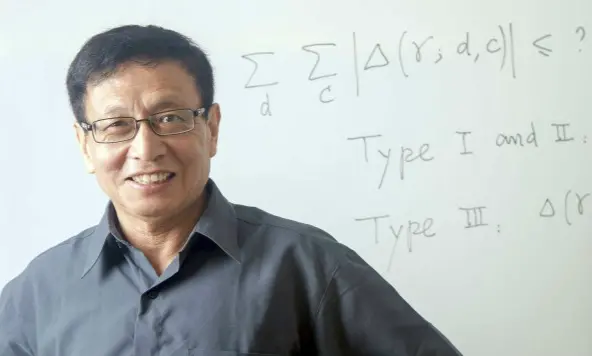Two mainland-born mathematicians were awarded a Hong Kong science prize for their contributions – one into the nature of prime numbers and the other in more practical applications of managing financial risks.
Zhang Yitang, a numbers theorist at the University of California, Santa Barbara, and Peng Shige, a financial mathematician with Shandong University in Jinan, won the Qiu Shi outstanding scientist award. Each received a grant of one million yuan (HK$1.16 million) at a ceremony at Peking University on Saturday.
Professor Cheng Shiu-yuen, from the Yau Mathematical Sciences Centre at Tsinghua University, said Zhang was a genius and Peng was a fighter. Both had received numerous awards and were highly respected in maths, he said. “They are masters in their fields of research,” said Cheng, a former dean with the University of Science and Technology.
Zhang’s discovery was hailed by some as significant in that it established new properties of pairs of prime numbers. Primes are numbers that can only be divided by themselves and one.
“I love mathematics, a love deep in my bones,” Zhang said, but he added that his discovery had “no practical use”.
But Peng, who is also a theoretical mathematician, disagreed.
“A mathematician can not foresee the applications of his work,” he said, just as Einstein could not see a nuclear bomb as the outcome of his theories.
Peng’s award was for his numerous financial modelling equations, which estimate the chance of a financial system collapsing in the real world.
The equations have been used by financial institutions and governments around the world for decades, and Peng and his students are deeply involved in the development of China’s financial risk controls.
China’s economy would continue to open to the world as the country’s financial mathematicians developed their skills, he said, but at a controlled speed.
“We are not only guarding against risks for China, but the world as well. If China goes wrong, the world suffers,” Peng said.
The Qiu Shi annual award – qiu shi means “quest for truth” – was established by late Hong Kong industrialist and philanthropist Cha Chi Ming in 1994. Ten young Chinese scientists also received a grant of US$150,000 each from the Qiu Shi Science and Technologies Foundation as part of this year’s award.
Previous Qiu Shi Award winners include Tu Youyou, who later received the Nobel Prize in medicine for the discovery of artemisinin, which saved millions of lives from malaria; and Pan Jianwei, who later led the launch of the world’s first quantum satellite.
Payson Cha Mou-Sing, chairman of the foundation, said he was impressed by the achievements made by Chinese scientists and the change in their research conditions in recent years.
“My father established the foundation to encourage the development of the sciences in China. That was 23 years ago, when some researchers on the mainland couldn’t even afford a suit, and that deeply disturbed him,” said Cha, also the chairman of developer HKRI.
Today it was difficult to find talented researchers in such dire condition, but there were always Chinese scientists who needed support and recognition, he said.
“We will continue, and strengthen, our support,” Cha added.
Zhang said the award money would help pay the mortgage on his family’s new home in California. He said he had spent years washing dishes in restaurants and manning the pump at a petrol station, until he found a teaching post with a low salary in New Hampshire, where he stayed for 16 years.
Peng said he had not decided how to use the money, but that he had considered using some to facilitate an international exchange of Chinese financial mathematicians, many of whom were working outside of China.
(SOUTH CHINA MORNING POST)
 简体中文
简体中文

